CAUSE OF THE FLOOD
In chapter 6 we see not only the Flood, but also the reason for the judgment of the Flood.
The previous chapter traced the generations from Adam through his son Seth and all of the way to Noah.
This chapter reveals that Noah will be the man through whom God will preserve humanity for a new beginning after wiping out all life on the face of the earth.
God tells Noah to build an enormous structure, an ark, and prepare to welcome representatives of all of the animals on earth. Noah does exactly that, setting the stage for the cataclysmic judgment of God to come in chapter 7.
Genesis 6:1-7 KJV
[1] And it came to pass, when men began to multiply on the face of the earth, and daughters were born unto them,
[2] That the sons of God saw the daughters of men that they were fair; and they took them wives of all which they chose.
[3] And the LORD said, My spirit shall not always strive with man, for that he also is flesh: yet his days shall be an hundred and twenty years.
[4] There were giants in the earth in those days; and also after that, when the sons of God came in unto the daughters of men, and they bare children to them, the same became mighty men which were of old, men of renown.
[5] And GOD saw that the wickedness of man was great in the earth, and that every imagination of the thoughts of his heart was only evil continually.
[6] And it repented the LORD that he had made man on the earth, and it grieved him at his heart.
[7] And the LORD said, I will destroy man whom I have created from the face of the earth; both man, and beast, and the creeping thing, and the fowls of the air; for it repenteth me that I have made them.

Genesis 6:1
And it came to pass, when men began to multiply on the face of the earth, and daughters were born unto them,
Such long lifespans as indicated in the record of chapter 5 caused a massive increase in earth’s population. This matter of “the sons of God” and “the daughters of men” is something that has caused no end of discussion.
There are a great many of good men who take the position that “the sons of God” were angels. A number of teachers teach, that the sons of God were angels, and I recognize that a great many of the present-day expositors take that position.
However, if these were good angels, they would not commit this sin, and evil angels could never be designated as “sons of God.”
Also, the offspring here were men; they were not monstrosities. I do not know why it is assumed by so many that the offspring were giants. We will look at this more closely when we come to verse 4.
The previous chapter covered the lineage of Noah, through each generation from Adam through Seth, and their sons. At the start of chapter 6, Genesis stops to take a look at the larger world from God’s perspective.
In brief: He doesn’t like what He sees. Mankind’s actions and thoughts are completely evil (Genesis 6:5). Seeing how far man has fallen since being evicted from Eden causes God substantial grief (Genesis 6:6).
Verses 1 and 2 are part of a single thought. Though not many women have been mentioned in the text thus far, daughters are being born as humanity expands across the face of the earth.
As we’ll see, those human women are attracting the attention of a group called “the sons of God.” No further description is given of these men, which means their exact identity is not particularly important. If it was, Scripture would have provided additional details.
Most likely, this reference to the “sons of God” is a challenge to ancient perceptions of royalty. God is about to judge the world with a flood. Not even the children of humanity’s kings and emperors, who often claimed to be divine, will be spared.
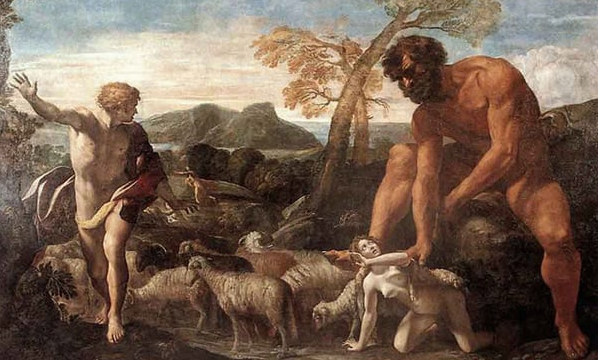
Genesis 6:2
That the sons of God saw the daughters of men that they were fair; and they took them wives of all which they chose.
The sons of God, identified elsewhere almost exclusively as angels, saw and took wives of the human race. This produced an unnatural union which violated the God-ordained order of human marriage and procreation as found in Gen. 2:24.
Some have argued that the sons of God were the sons of Seth who cohabited with the daughters of Cain; others suggest they were perhaps human kings wanting to build harems. But the passage puts strong emphasis on the angelic versus human contrast.
The NT places this account in sequence with other Genesis events and identifies it as involving fallen angels who indwelt men. Matthew 22:30 does not necessarily negate the possibility that angels are capable of procreation, but just that they do not marry.
However, to procreate physically, demons had to possess human, male bodies, making this an unnatural process. This matter of “the sons of God” and “the daughters of men” is something that has caused no end of discussion.
There are a great many good men who take the position that “the sons of God” were angels. I personally cannot accept that at all. Most of my teachers taught that the sons of God were angels, and I recognize that a great many of the present-day expositors take that position.
However, if these were good angels, they would not commit this sin, and evil angels could never be designated as “sons of God.” Also, the offspring here were men; they were not monstrosities.
I do not know why it is assumed by so many that the offspring were giants. We will look at this more closely when we come to verse 4.
This fascinating and much-debated verse concludes a thought begun in the previous one. As humanity began to expand across the earth, human daughters were born. These human women were attractive to the “sons of God.” The sons of God took as wives any of the women they chose.
So who were the “sons of God”?
Several ideas have been offered by scholars over the centuries.
Some have suggested that the sons of God are the men of the line of Seth described in the previous chapter, while the “daughters of men” are from the line of Cain. This idea doesn’t seem to fit, however, with what we’re told in the following verses.
Many scholars believe these “sons of God” to be angels or demons (fallen angels)—or to be human men possessed by demons. This could also explain God’s apparent objection to these “sons of God” and their offspring.
Finally, others suggest “sons of God” was a designation given to the human rulers of the time. Human kings and lords throughout history have often claimed to be divine to bolster their own authority.
Perhaps these were merely powerful men, taking their pick of the women of the earth. This would fit with the ancient practice of taking many wives or having a harem of sexual servants.
In the context of the upcoming flood, that would make this passage a refutation of their claims to divinity. Even the so-called divine rulers will be judged by the One True God in the flood.

Genesis 6:3
And the LORD said, My spirit shall not always strive with man, for that he also is flesh: yet his days shall be an hundred and twenty years.
The Holy Spirit played a most active role in the OT. The Spirit had been striving to call people to repentance and righteousness, especially as Scripture notes, through the preaching of Enoch and Noah.
One hundred and twenty years, is the span of time until the Flood, in which man was given opportunity to respond to the warning that God’s Spirit would not always be patient.
We believe that Noah preached for 120 years, and during that time the Spirit of God was striving with men.
Peter makes it very clear that it was back in the days of Noah that the Spirit of God was striving with men in order that He might bring them to God—but they would not turn.
“For Christ also hath once suffered for sins, the just for the unjust, that he might bring us to God, being put to death in the flesh, but quickened by the Spirit: By which also he went and preached unto the spirits in prison” (1 Pet. 3:18–19).
These spirits were in prison when Peter wrote, but they were preached to in the days of Noah.
How do we know that?
Well, Verse 20 reads: “Which sometime were disobedient, when once the long-suffering of God waited in the days of Noah, while the ark was a preparing, wherein few, that is, eight souls were saved by water.”
When were they disobedient?
During the long—suffering of God in the days of Noah—during those 120 years.
This is another fascinating verse which has been interpreted through several different perspectives over the years. It falls in the middle of a paragraph describing how a group known as the “sons of God” took human wives who gave birth to a generation of famous “mighty men.”
Taken in direct context, this verse seems to declare that God will not let humans continue to lead such long lives. Perhaps the children of the “sons of God” and human women would otherwise have gone on living an extraordinarily long time.
Or perhaps God is merely saying that even the normal lifespan of humans was too long, given the evil that is taking place on the earth. Considering how much evil man is capable of with a lifetime of less than a century, the capacity for evil over many centuries is immense.
In either case, God says that He will not allow His Spirit to remain in man forever. God’s Spirit, in this sense, seems to be His “breath of life.” Humans cannot live without God’s Spirit or life-force; we are dependent on God to continue to exist.
Now God declares that He will place a natural limit of 120 years on that mortal existence. Looking at life spans for those born after the flood, this seems to be the case. While not a literal maximum, life spans after the flood rapidly decrease until few live longer than 100 years.
Some have offered an alternate explanation for this verse: that God is declaring His judgment will come on the earth 120 years from the time of this pronouncement. That could be.
It is also true, though, that eventually human lifespans decreased to a maximum of approximately 120 years. Joseph, for instance, lives to be 110. Moses lives to be exactly 120 years old, while his brother Aaron lives to be 123.
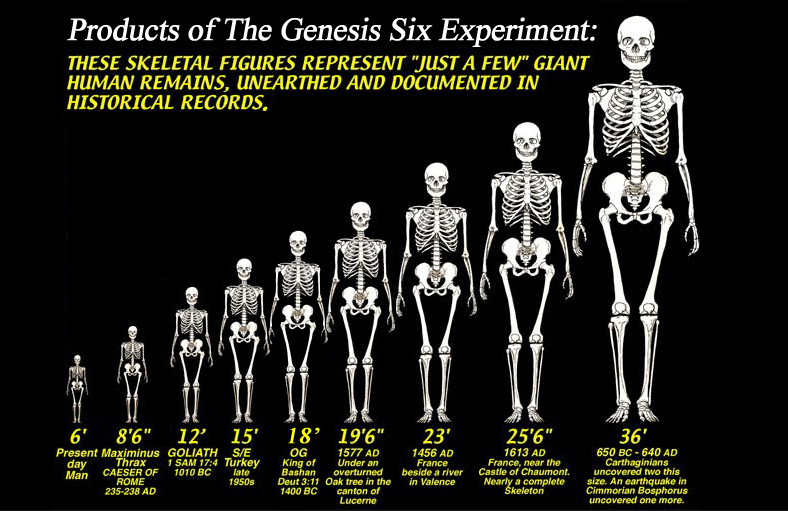
Genesis 6:4
There were giants in the earth in those days; and also after that, when the sons of God came in unto the daughters of men, and they bare children to them, the same became mighty men which were of old, men of renown.
The word Nephilim is from a root meaning “to fall,” indicating that they were strong men who “fell” on others in the sense of overpowering them. They were already in the earth when the “mighty men” and “men of renown” were born.
The fallen ones are not the offspring from the union in verses 1 and 2. It says, “There were giants in the earth in those days,” but it does not say they are the offspring of the sons of God and the daughters of men.
It does say this about the offspring: “the same became mighty men which were of old, men of renown.” These were not monstrosities; they were men.
The record here makes it very clear that the giants were in the earth before this took place, and it simply means that these offspring were outstanding individuals. Humanity has a tremendous capacity.
Man is fearfully and wonderfully made—that is a great truth we have lost sight of. This idea that man has come up from some protoplasm out of a garbage can or seaweed is utterly preposterous.
It is the belief of some scientists that evolution will be repudiated, and some folk are going to look ridiculous at that time. Evolution is nothing in the world but a theory as far as science is concerned.
Nothing has been conclusive about it. It is a philosophy like any other philosophy, and it can be accepted or rejected. When it is accepted, it certainly leads to some very crazy solutions to the problems of the world, and it has gotten this country into trouble throughout the world.
Anyone would think that we are the white knight riding through the world straightening out wrongs. We are wrong on the inside ourselves!
I do not know why in this country today we have an intelligentsia in our colleges, our government, our news media, and our military who think they are super, that somehow or another they have arrived.
It is the delusion of the hour that men think that they are greater than they really are. Man is suffering from a fall, an awful fall. He is totally depraved today, and until that is taken into consideration, we are in trouble all the way along.
Then what do we have here in verse 4?
As I see it, Genesis is a book of genealogies—it is a book of the families. The sons of God are the godly line who have come down from Adam through Seth, and the daughters of men belong to the line of Cain.
What you have here now is an intermingling and intermarriage of these two lines, until finally the entire line is totally corrupted (well, not totally; there is one exception). That is the picture that is presented to us here.
I recognize, and I want to insist upon it, that many fine expositors take the opposite view that the sons of God are actually angels. If you accept that view, you will be in good company, but I am sure that most of you want to be right and will want to go along with me.
Regardless of which view you take, I hope all of us will be friends, because this is merely a matter of interpretation. It does not have anything to do with whether or not you believe the Bible but concerns only the interpretation of the facts of Scripture.
What was the condition on the earth before the Flood?
What caused God to bring the judgment of the Flood?
This is the final verse in a paragraph about a group called “the sons of God” marrying women and giving birth to a generation of famous “mighty men.” As discussed in the notes on verse 2, these “sons of God” may have been human leaders who proclaimed themselves gods.
This was a common tactic of emperors and kings: to claim divine birth or godly traits. In that case, this passage serves to refute their claims. God’s upcoming flood will prove that there is no divine nature in these evil rulers.
Their taking of “any [wives] they chose” suggests the all-too-common practice of kings having multiple wives and a harem of sexual servants.
This verse is also one of only two mentions of an extremely controversial group: the Nephilim. They do not appear themselves to be the “sons of God.”
Perhaps they were the children of the “sons of God” and the women they married. We’re told the Nephilim were on the earth both in this era and “afterward,” likely in the era following the flood.
The other mention of Nephilim in the Bible is in Numbers 13:33. The Israelite spies, collecting intelligence on the Promised Land, saw a race of men who made them look like grasshoppers in comparison.
Nephilim are commonly thought to be a race of giants, in this case simply meaning very large humans. Their mention in the book of Numbers, long after the flood, suggests a supernatural influence.
In the flood, all of humanity aside from Noah’s family will be wiped out. This supports the suggestion that the Nephilim are the product of supernatural fathers—fallen angels or demons—and human women.
Other scholars look at this verse in contrast to Matthew 22:30, and suggest that these are men indwelt (possessed) by fallen angels, not biologically sired by them. In either case, the “sons of God” and human women did bear children who became famous as “mighty men” of old.
It is possible these were merely human men famous for their power and influence on the earth. Or it is possible they were in some way supernaturally empowered and thus accomplished unusual things.
Despite the considerable controversy over the Nephilim, it’s important to remember how little the Bible actually says about them. God’s Word is written for a purpose, and clearly that purpose does not include relaying details about the Nephilim.
Whoever or whatever they were, Scripture clearly considers other topics much more worthy of our concern.
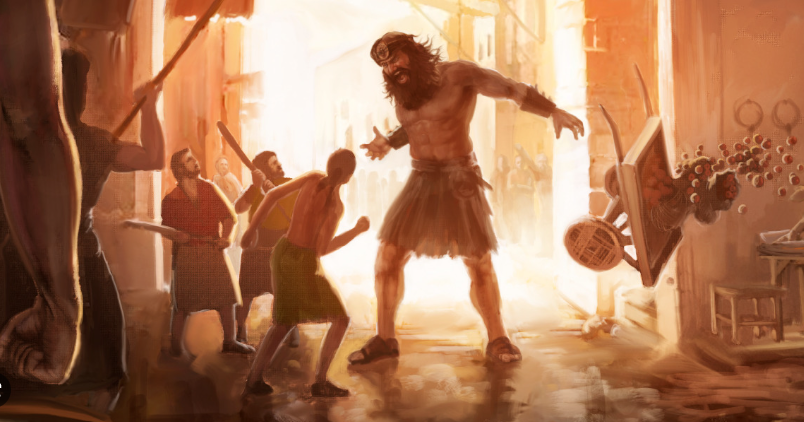
Genesis 6:5
And GOD saw that the wickedness of man was great in the earth, and that every imagination of the thoughts of his heart was only evil continually.
This is one of the strongest and clearest statements about man’s sinful nature. Sin begins in the thought-life. The people of Noah’s day were exceedingly wicked, from the inside out.
There are four words here that ought to be emphasized and which I have marked in my Bible. “The wickedness of man was great.” “Every imagination of the thoughts of his heart was only evil.” Only evil—that is all it was—and that “continually.”
These four words reveal the condition of the human family that was upon the earth.
This heartbreaking verse echoes Genesis 1:31. That verse described God seeing all that He had made after the sixth and final day of creation and observing that “behold, it was very good.”
Now, hundreds of years after human sin had entered the world, God sees that man’s wickedness is the thing that is great in the earth. In addition, God sees that every intention of the thoughts of the human heart is only evil continually.
Taking the genealogies of the past chapter literally, this is especially sad. The long lifespans of Genesis 5 imply that there was an almost-unbroken line of eyewitnesses to man’s earliest history, right up to the year of the flood.
Mankind’s sin is not the result of error or drifting or ignorance. It’s the result of a deliberate rejection of God.
God’s conclusion about the state of humanity is an all-encompassing declaration of human depravity. Left to follow our own way, apart from God, men and women will always choose evil.
It’s not just what we do; it’s who we are without His direct involvement and transformation of our hearts. This goes a long way to explaining God’s apparent decision to drastically reduce human lifespans (Genesis 6:3).
This verse offers another clue to the nature of humanity: Our sinfulness, our inclination to do what is harmful, begins in our minds or hearts. In our Godless state, we do not happen into sin.
We intentionally plan for it. It’s where we want to go. It’s not just our actions that are the problem; it is the hearts and minds that produce those actions.
We haven’t improved over the centuries. Our natures remain the same. When describing the Day of the Lord in Matthew 24, God’s coming judgment for human sin, Jesus declares that it will be as in the days of Noah (Matthew 24:36–39).
All these years later, without God’s redemption and recreation, the human heart remains inclined to plan for evil continually.

Genesis 6:6
And it repented the LORD that he had made man on the earth, and it grieved him at his heart.
Sin sorrowed God who is Holy and without blemish. “And it repented the LORD.”
What repented the Lord?
The corruption of man repented the Lord. It looks as if God has changed His mind and intends to remove man from the earth. He probably did just that with a former creation on the earth.
Although it grieved God because of man’s sin, thank God, He did not destroy him.
The Bible rarely speaks of God experiencing “regret.” The Hebrew word used here is yin’nā’hem, from the root word nacham. The word is exclusively about emotions: a feeling of pain, sadness, or unhappiness.
The word does not imply that God feels He has made a mistake, or that He wishes to have done differently. It is possible to experience grief and “regret,” as used here, without implying an error.
Any parent who has held a crying, upset child as they receive a shot has experienced exactly that. Such a parent is “grieved” over the pain, but has no illusions that this was the wrong decision.
However, this verse does mean God is unhappy with the current state of man. This is a low point in the history of humanity. God is troubled. He is “grieved,” or “pained,” by the outcome of His act of creation.
The men and women, however, do not grieve their own sin. They do not repent. God’s grief stands in great contrast to that of His creatures, who blindly continue to indulge in every sinful thought, action, and word that begins in their hearts and minds.
Left alone, the evil of man will eventually overtake the entire race, and there will be no godly people left. There will be no line to produce the already-promised Messiah (Genesis 3:15). God will not let the earth go on like this indefinitely.
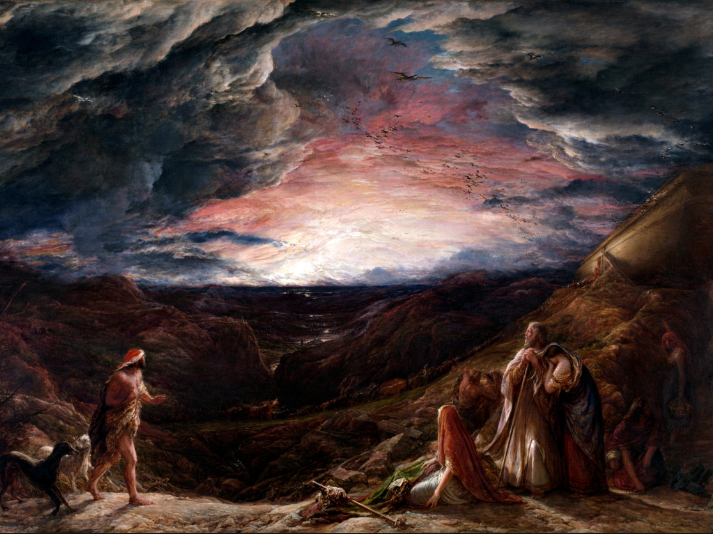
Genesis 6:7
And the LORD said, I will destroy man whom I have created from the face of the earth; both man, and beast, and the creeping thing, and the fowls of the air; for it repenteth me that I have made them.
God promised total destruction when His patience ran out. It does not mention fish because they are in the water, and He is simply going to send more water.
One of the most devastating verses in Scripture, verse 7 expresses both God’s sorrow in seeing what humanity has become, and His pronouncement that He will wipe from the face of the earth so much of what He has made. These words raise many questions.
How can a perfect, sovereign God feel sorrow about any action He has taken? The Hebrew word ni’ham’ti used here, is from the same root word as yin’nā’hem, used in verse 6. This term is nacham, and it refers to emotions.
The primary meaning is simply one of pain, anguish, or unhappiness. It’s entirely possible for a person to feel unhappiness about a situation, without considering it the “wrong” choice.
God is sorry that man has come to this state—His decision to create man is, in this moment, causing Him grief. He is not suggesting that He’s made a mistake in creating us.
Another question is why God is committed to destroying animals and birds, along with humanity? This is an issue the Bible gives virtually no guidance on.
Ultimately, we can wonder, and we can question, but we can’t give a dogmatic response. What we do know is that God’s sovereignty and ownership over the earth includes animals just as much as humans.
Those first two questions are difficult to answer in a satisfying way.
A third question, however, is actually the entire point of Scripture itself: If this—destruction and wrath—is God’s response to humanity in our natural, sinful state, how can we ever hope to be at peace with our Creator?
The book of Genesis, as with the rest of Scripture, will present God’s answer to this dilemma. In short, God provides both the judgment which is required for sin, as well as a means of mercy for humanity.
The following verse will provide a glimmer of hope that all is not lost for mankind.
I hope that you have really enjoyed this post,
Please Leave All Comments in the Comment Box Below ↓

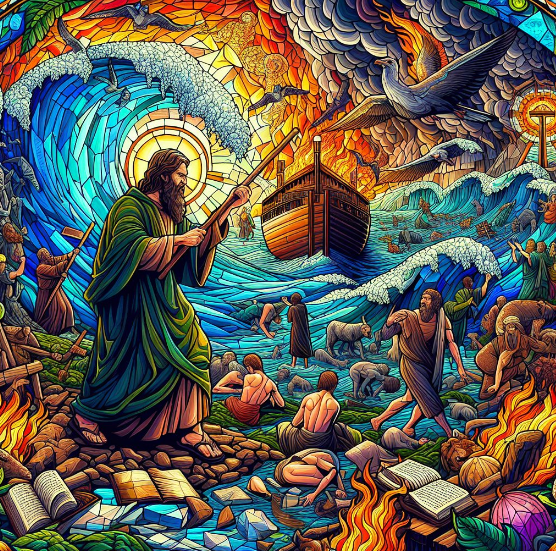











This is an interesting interpretation of why God destroyed man and choose Noah to be the one to survive.
I did not previously know that the sons of God was identified elsewhere, almost exclusively as angels, who then saw and took wives of the human race.
This produced an unnatural union which violated the God-ordained order of human marriage and procreation.
So I knew that Noah was selected because he was not a sinner in the eyes of God, whereas everybody else were sinners, that had become too bad.
Thank you for putting it in a different light for me.
Hello,
Matthew 22:30 does not necessarily negate the possibility that angels are capable of procreation, but just that they do not marry. However, to procreate physically, demons had to possess human, male bodies, making this an unnatural process.
Such long lifespans as indicated in the record of chapter 5 caused a massive increase in earth’s population.
One hundred and twenty years, is the span of time until the Flood, in which man was given the opportunity to respond to the warning that God’s Spirit would not always be patient.
Thank you for commenting,
Jerry
Your comment about the identity of the “sons of God” and the debate surrounding it is particularly interesting.
The different perspectives you presented, whether they are angels, human rulers, or a specific lineage, show the complexity of interpreting ancient texts and the range of interpretations that scholars and theologians have proposed throughout history.
It highlights the importance of context, historical background, and linguistic analysis when approaching religious texts.
Hi Anoth,
Thank you for stopping by, reading, and taking the time to comment on another Holy Bible Study session, turned HBS & DwJ Podcast episode.
I always enjoy learning more of God’s view of us, His creation. I find it to be particularly interesting, so thank you for seeing He, who is in me.
In addition to your comment, even evolutionists have all their theories when approaching religious texts. The important thing I have always heard from priests and scholars is that the Holy Bible cannot always be interpreted literally.
Scientists, Evolutionists, etc. will continue to try to prove everything with their own theories. However, they often cannot answer questions like who created all matter, not to mention the galaxies and everything exsisting in them.
Thank you for your interest in this topic.
Blessings My Friend!
The identity of the “sons of God” mentioned in certain religious texts has been a topic of debate and speculation for centuries.
Different interpretations have been proposed, leading to varying beliefs among scholars and religious communities. Some believe that the “sons of God” refer to angels or divine beings, while others argue that they are human beings in a special relationship with God.
The debate surrounding this topic often centers on the theological implications and the understanding of the relationship between God and humanity. It is a fascinating area of study that invites further exploration and discussion.
Hello Herman,
Thank you for sharing your interest in The Wickedness Of The World – The Righteousness Of Noah.
It is my pleasure to share this information with you. It seems to me that a large amout of the entire Holy Bible has been a topic of debate and speculation for centuries.
Praying and Meditating on the scriptures is what helps me with revelation about what I need to know at that moment.
However, I can go back to the same scripture some time later and Pray and Meditate, I sometimes get a more indepth Revelation.
Thank you for your continued support with helping HBS & DwJ spread GOD’s Word.
Blessings Unto You My Friend!
Hey,
This passage is a reminder of the importance of following God and staying away from sin. It also shows that God is always willing to forgive those who turn to him.
What do you think the significance of the “sons of God” and the “daughters of men” is?
Do you believe that they were angels?
What do you think the offspring of these unions were?
Jeffrey
Hello Jeffrey,
Thanks for stopping by the HBS & DwJ Website again.
Since I wasn’t there, I can’t be 100% sure, but it may be possible that these “sons of God” may have been human leaders who proclaimed themselves gods.
It is possible these were merely human men famous for their power and influence on the earth. Or it is possible they were in some way supernaturally empowered and thus accomplished unusual things.
Despite the considerable controversy over the Nephilim, it’s important to remember how little the Bible actually says about them. God’s Word is written for a purpose, and clearly that purpose does not include relaying details about the Nephilim. Whoever or whatever they were, Scripture clearly considers other topics much more worthy of our concern.
Thank you for continuing to stop by and comment on various sections of the HBS & DwJ Website turned Podcast.
Please Have A Blessed Day!
Hello there!
After reading your commentary on Genesis 6, I found it thought-provoking and engaging. It raised interesting points about the wickedness of humanity, the identity of the “sons of God,” and the nature of the Nephilim. It also explored God’s response to the situation and His decision to bring about the flood.
I’m particularly intrigued by the idea of God’s emotions and His plan for humanity’s salvation.
How do you personally reconcile the concept of God-feeling sorrow and regret about His creation with His ultimate plan for redemption and mercy?
It’s a fascinating topic, and I would love to hear your insights on it.
Looking forward to your response!
Hello Israel,
Welcome back to the HBS & DwJ website.
Although I am not perfect, and never claimed to be, I talk to GOD as often as I can. He is there for us not only in times of need, but in times when we just want to talk. We must understand that Praying connects GOD with us, His children.
I try my best to obey GOD’s commandments by, treating others with kindness and honesty. I have learned that obeying God’s Will, will help us to become brighter and stronger in spirit, integrity and in our minds.
I study the Holy Bible Scriptures each day to revitalize my soul. This helps me to become a Doer, as well as, a Hearer of GOD’s Will.
Each day, I let GOD know that I am thankful for His continued Graces and Mercies.
We are truly Blessed,
Blessings My Friend!